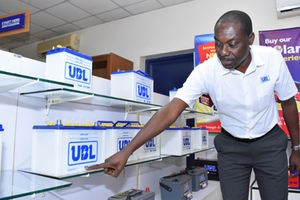
Barbara Mulwana took on her father the late James Mulwana’s family business empire of Jesa Farm Dairy, Nice House of Plastics and Uganda Batteries. Family businesses should build multigenerational resilience by paying attention to family trust. PHOTO/STEPHEN OTAGE
“My son wonders if I will not practise ‘taking away privileges’ when they join us in the business in case of any challenges as I did when they were younger. How do I go about that?” Ms Jacqueline Bigirwa Nuwamanya asked during the Enjovu Family Business Conference recently.
Succession fears such as these grip many Ugandan business owners, so hard that some choose not to involve their children in the business running.
Ms Nuwamanya wears several business hats. She is the managing director of Rural Communications Centre Ltd, an MTN franchise, chief executive officer of Prosperous Coach, and an International Coaching Federation (ICF) certified financial management trainer.
Working with her husband, they are commercial cattle keepers under Banuti Ranchers, which is the main family business. The couple believes their children should be part of the businesses and one of the strategies has been to expose them to the businesses that they run.
“We have taught them to understand the value of money. For instance, when afforded an opportunity of a family business, you don’t throw it away because you’re not interested in it. Say, while you are not a coach and it is not your niche, if I started a coaching hub and you are the managing director, you can support me by looking for coaches,” she says.
There is also hope that by looking at how their father, leveraging education and employment experience, commercialised cattle keeping, they can pick a leaf.
“While he was in formal employment, he started his farm and later went into cattle keeping full-time. Having got the opportunity to study abroad, we believe they can take it to international markets because they have bigger networks and have been exposed to bigger opportunities,” she says.
With employment being a big thing for everyone, Ms Nuwamanya’s drive to engage the children in the family businesses is that they have created employment for them.
“For example, I have built the MTN franchise for 19 years with tried and tested systems and structures. Why would they throw that away to be employed somewhere else?” she asks.
The end goal is to have the children look at all the available enterprises as businesses hence bringing their expertise on board to grow them to the next level. She believes that they can use their different expertise to come and plug into the farm.
Despite all the good intentions many business founders, and parents in this case may have, the children may not appreciate the effort. It is incumbent on the parents to ensure that the would-be successors understand and appreciate the business.
That is why Ms Nuwamanya, from when the children were very young, started exposing them to farming. That took the curve of never having holidays in Kampala but on the farm.
“It is exciting to see their enthusiasm because being young teenagers, you would expect them to want to stay in Kampala.

Ms Jacqueline Bigirwa Nuwamanya, the cofounder of Banuti Ranchers. PHOTO/JOAN SALMON
However, if we take long without going to the farm, they nudge me about it because they find farm life more interesting than Kampala. That shows they are comfortable living there, even spending their three-month summer holidays there without a moment in the city. Comfort is where it starts from,” she says.
Born and raised in Kampala their love beats hers because Ms Nuwamanya often struggled with going to the farm, long before the children came along. Often looking for reasons not to make the trip, she says the children are different as they are inquisitive.
One asked, “So you mean I can use the money from this farm to pay for my university? Money from our cows?”
It is such questions that prod the Nuwamanyas to show the children more. However, they also avoid trying to fit all of them in one box. While their son has done international business, one daughter is doing law, while another is going for engineering at the end of September.
With their diversity, the question Ms Nuwamanya and her husband ask them is, “What expertise do you bring to the table?” That is because the belief is that the business can only grow when their education brings more than cattle keeping.
“My husband carries out the farm operations with the herdsmen. However, to take the business to the next level, like getting into international markets, the children will need to bring in this level of expertise. Therefore, while we shall support the children to pursue that course, we hope that they use that knowledge to better the farm. For instance, with international trade, they draft proper contracts and look at due diligence. With such expertise, the business will blossom,” she says.
On returning from school, the son joined the business where he earns a salary and it shocked him. Ms Nuwamanya says the young man leapt with joy in a way she had never seen that he asked to return to the farm.
“If I am earning a salary from this thing, I must spend more time at the farm than in Kampala,” he said.
The conversation which was also on the family chat sparked excitement in the children, increasing their interest in working at the farm during the holidays.
Ms Nuwamanya says earning was another tricky thing for her son. She also appreciates his father for showing him that working in a family business can be profitable.
“Many parents make a mistake to think that because they are taking care of the children, they do not have to pay them a salary. However, their peers are earning, which demotivates many from being part of family businesses,” she says.
Learning their interests
Mr Stephen Kiyimba Kaggwa, the proprietor of Ebenezer Laboratories, says he has involved his children in the running of the business from when they were still young. This was during school holidays and vacations.
“I employed them during their vacations and ensured I paid them an allowance. It was never free work,” he says.
Mr Kiyimba also had a different relationship with their work, where he was not ‘daddy’ but their employer.
“That meant explaining to them that while we share food at home, at the office, they are given their money for meals, just like other employees. For instance, meals such as lunch were with fellow workers while I had mine in my office,” he says.
While a parent may not dictate their child’s career aspirations, Mr Kiyimba notes that providing them with employment experience can prepare them for the world of work.
“The idea was never to get them to work here but to expose them to the working environment. Thereafter, the interested ones would stay on. Only one got interested and though he studied something else, he is working with me,” he says.

A woman monitors the business records with her children in a shop. Children can be part of that family business even if they have to pursue other interests. PHOTO/Michael Kakumirizi
Despite the rest working elsewhere, My Kiyimba is comforted that in his absence, they can remain at a supervisory level because they know how the business is run.
“I am thankful that they have worked with me because we have got to know each other better. I now understand their interests and we relate better,” he says.
Children in diaspora
For parents who have educated their children from abroad, the question that gives them sleepless nights is whether they will return to the family business. That was Mr Titus Muya, the founder of Family Bank, who asked his children for years to take the business reins as he was ageing. After several unheeded calls, on their (Mr and Mrs Muya) trip to visit their children, they informed them of their decision to sell the family business.
“That awoke them because they started to return home from the end of 2019,” he says.
Discipline
While all families have disagreements, discipline is crucial when dealing with children in family businesses and Mr Muya has had his fair share. One of these was when his son, Mr Julius K Muyah made disrespectful remarks.

Mr Titus Muya, the founder of Family Bank, asked his children for years to take the business reins as he was aging. After several unheeded calls, on their (Mr and Mrs Muya) trip to visit their children, they informed them of their decision to sell the family business. PHOTO/JOAN SALMON
“I said something that I should not have said. He ensured I never forget my misdemeanour by throwing me off the board for a year,” Mr Muyah says.
“We need to learn to disagree with respect because there will be intense situations. Moreover, parent and child will never think the same because of varying experiences and age differences,”Mr Muyah says.
Teaching the dynamics
Mr Charles Ocici, the executive officer of Enterprise Uganda, faults business owners for failing to bring their children aboard hence poor succession in Uganda’s family businesses.
“Many do not make the businesses attractive to their children, as they make them unworthy of being a part of. To tackle this, allow them to work with you during the holidays. It can be directly participating in the operations of the business, or a few activities such as record keeping. That will birth in them an understanding about the business,” he says.
Dealing with stepchildren
Family businesses often fail after the demise of the founder due to undeclared children. Even in instances where they are declared, they remain away from the main family, which deters bonding, causing rifts. Mr Muya had this issue but chose to deal with it in a candid conversation.
“I like being transparent with my children and one day, I had a chat with them regarding their other siblings. I made it clear to them that while their mothers are not my wives, they are my children. I also asked them if it was better that they live well while their step-siblings struggled or that they arose after my demise creating court cases. I am thankful that they listened to me and these two girls are now working in the family business,” he says.
Allow them to leave
Mr Ocici says children can be part of that business while they pursue other interests because each of them will also be starting a family.
“Parents should desist from thinking that children can only participate in the family business. That pushes some children away. Allow them to start their business or career in parallel with the family business, assisting in its growth,” he says.
Family businesses are an amazing way to grow the economy. However, mentorship is the only way they can thrive and survive.






